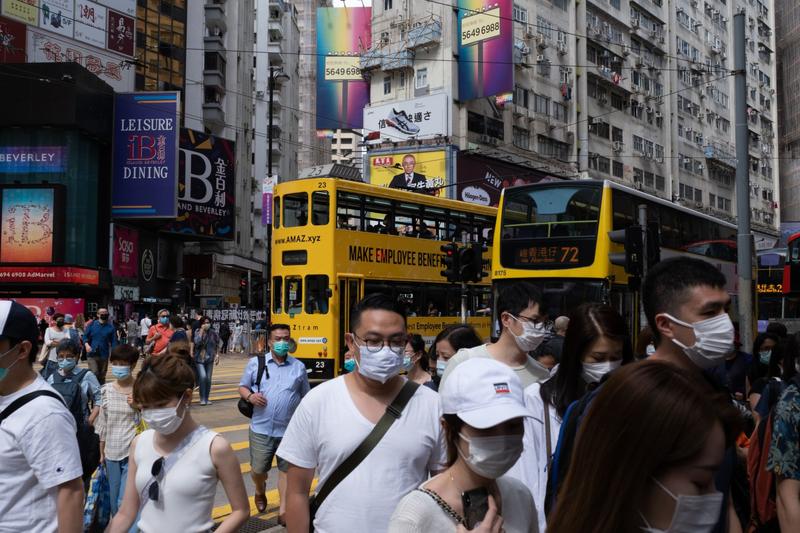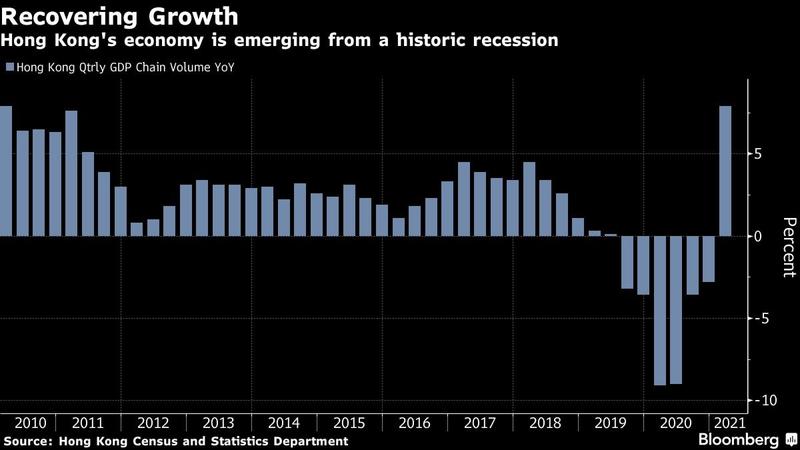 Pedestrians wearing protective masks cross Hennessy Road in Causeway Bay, Hong Kong, on May 1, 2020. (ROY LIU / BLOOMBERG)
Pedestrians wearing protective masks cross Hennessy Road in Causeway Bay, Hong Kong, on May 1, 2020. (ROY LIU / BLOOMBERG)
Hong Kong’s economic recovery is set for a fresh boost with the distribution of consumption vouchers beginning this weekend just as growth momentum in the city starts to steady.
A report Friday will likely show second-quarter gross-domestic product rose 7.8 percent from a year earlier, largely unchanged from the previous three months, according to the median estimate in a Bloomberg survey of economists. On a quarter-on-quarter basis, a better reflection of growth momentum, GDP is forecast to contract 0.8 percent.
Hong Kong’s economy is slowly emerging from a historic two-year recession spurred on by the pandemic and anti-government protests
Hong Kong’s economy is slowly emerging from a historic two-year recession spurred on by the pandemic and anti-government protests. Retailers and tourism-related businesses have been hit particularly hard with borders shut, and the consumption vouchers are one way authorities are trying to offset that burden.
ALSO READ: HK's economy bounces back in Q1 on strong exports growth
“We have seen some recovery in catering and retail sales,” said Iris Pang, chief economist for greater China with ING Bank NV. “The cash voucher depends on the multiplying effect of the voucher, whether consumers are willing to spend more than the voucher amount. This should be the case, but by how much more?”
Pang doesn’t expect a quarterly contraction, and forecasts 8.5 percent year-on-year growth for the April-June period.
Uneven rebound
The economy’s recovery this year has been uneven, exposing deepening wealth imbalances between the city’s working class and elite. Tourism, consumer and services industries, the biggest employers of many of Hong Kong’s working class, remain constrained by the pandemic.
The city is now distributing HK$5,000 (US$643) in electronic vouchers to permanent residents and eligible immigrants aged 18 and older to help sustain the recovery. The program will cost the government an estimated HK$36 billion, with Financial Secretary Paul Chan Mo-po estimating it would provide a 0.7 percentage-point bump to this year’s GDP, according to an April government report.
“I do expect a good recovery in private consumption under a stabilized pandemic situation in the second quarter,” said Aries Wong, a lecturer with Hong Kong Baptist University. “We should continue to see a moderate recovery in private consumption and business activities.”
The first installment of vouchers will be distributed starting Aug 1, with consumers needing to meet spending targets over a set period for the full amount depending on the medium of payment. More than 6.1 million registrations had been received as of July 18, Chan said in a blog post.
READ MORE: Hong Kong to begin handing out e-vouchers from Aug 1

The economy likely grew close to 8 percent in the first half of the year, and the strong recovery and steady outlook ahead may prompt the government to raise its growth forecasts, said William Deng, an economist with UBS Group AG.
“Strong trade growth has been a key driver of recent GDP growth, but domestic growth drivers are likely to come to the fore,” he said in a July 28 note. Deng also raised his 2021 growth forecast to 7 percent from 5.3 percent.
Local spending
The vouchers follow last year’s cash handouts of HK$10,000 to residents, but will only go so far with the pandemic clouding the outlook.
The voucher program could help somewhat to drive local spending, said Annie Yau Tse, chairman of the Hong Kong Retail Management Association. “But the scheme’s effectiveness may be impacted if the pandemic situation worsens again,” she said.
Peter Shiu, a legislator representing the wholesale and retail industry, expects the vouchers and rising vaccinations to encourage spending.
“The economic environment in the second half of the year will be much better,” he said.


